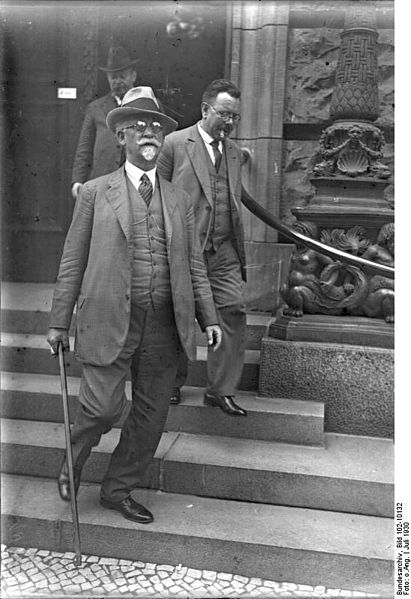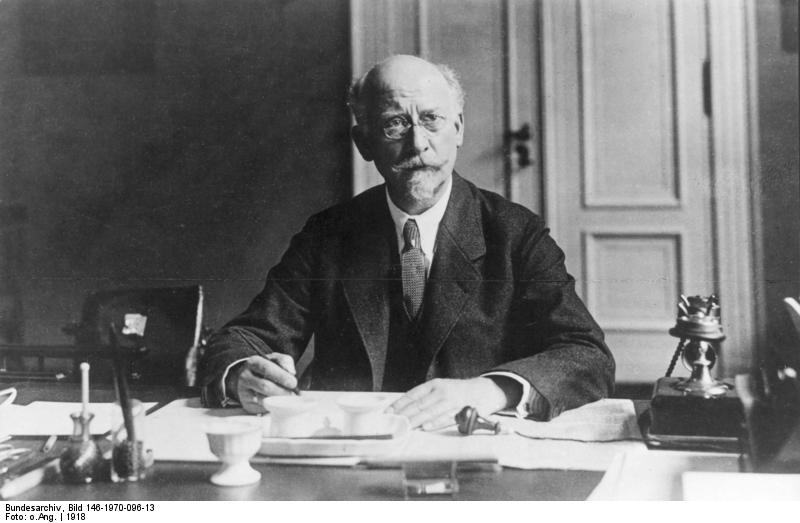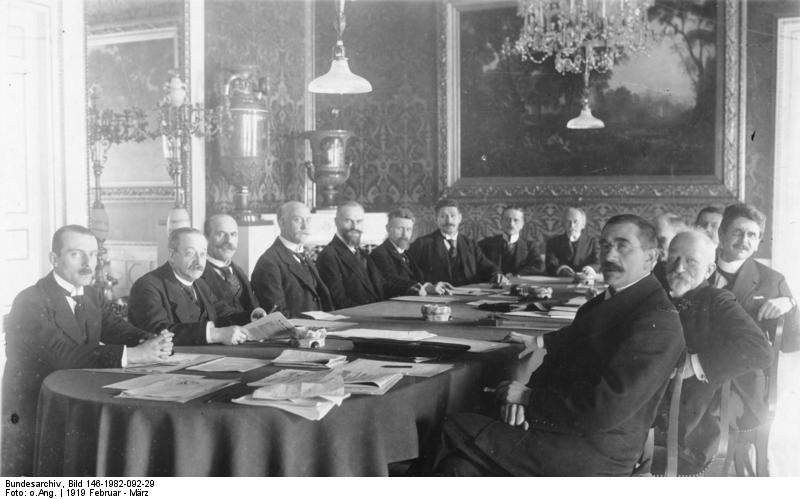<Back to Index>
- 10th Chancellor of Germany Philipp Scheidemann, 1865
PAGE SPONSOR
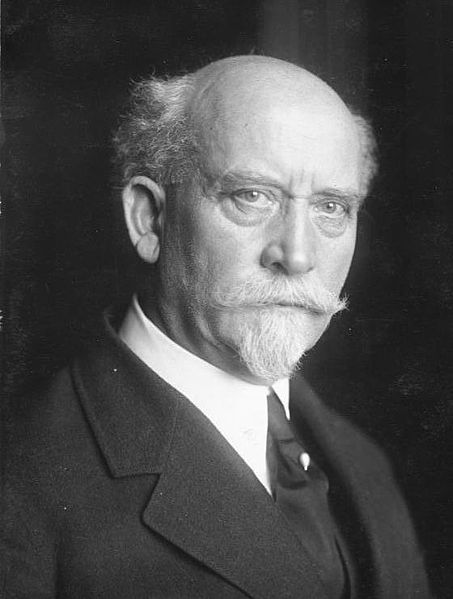
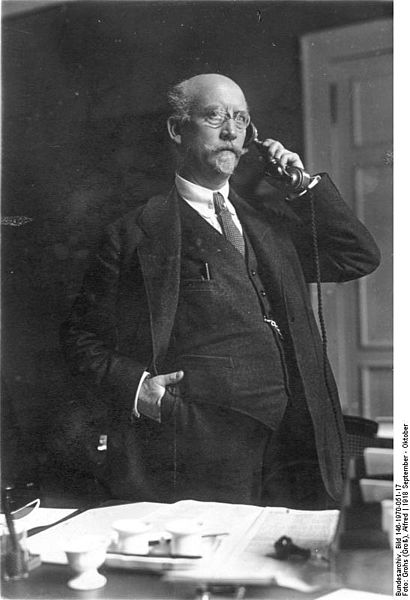
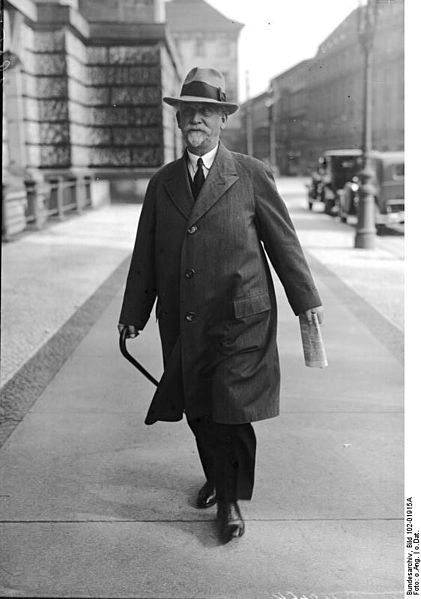
Philipp Scheidemann (26 July 1865 - 29 November 1939) was a German politician of the Social Democratic Party of Germany (SPD). During the German Revolution of 1918 - 1919 he proclaimed Germany a republic on 9 November 1918 and subsequently became the second Chancellor of the Weimar Republic, acting in this post for 127 days.
Born in Kassel, Scheidemann, from a modest artisan background, attended middle school and did an apprenticeship as a printer. He joined the SPD in 1883, in protest against Chancellor Otto von Bismarck's Anti - Socialist Laws. A member of the Free Trade Union, he worked in Marburg, where he attended lectures in philosophy at the university held by Hermann Cohen. In 1895 he took to editing Social Democratic newspapers, first at Giessen and afterwards successively at Nuremberg, Offenbach, and again in Kassel.
Upon the 1903 federal election, Scheidemann became a member of the Reichstag parliament, delegated from the Solingen district for the Social Democrats, and soon rose to be one of the principal leaders of the party. In 1911 he was elected a member of the executive committee and two years later succeeded August Bebel as chairman of the SPD parliamentary group together with Hugo Haase. An eloquent and witty orator, he and the grave party chairman Friedrich Ebert complemented each other. During the early years of his career, Scheidemann, actually a pragmatic politician, was regarded as a left wing exponent. His vitriolic rhetoric once made Chancellor Theobald von Bethmann - Hollweg leave the Reichstag debate chamber in protest. A speech held in Paris in 1912, on the eve of World War I, earned him the libel of a traitor of his country.
After the outbreak of the war in 1914 however, Scheidemann, along with Ebert was leader of the majority faction of the party, which continued to vote for war bonds, limiting his opposition to the war to urging the negotiation of a compromise peace without annexations. His declarations were nevertheless branded as "high treason" by nationalist circles. On the other hand, Scheidemann's utterances forwarded the break-up with the left wing Social Democrats led by Karl Liebknecht, leading to the establishment of the Independent Social Democratic Party of Germany (USPD) in 1917. In turn, Scheidemann approached to Progressive and Center Party MPs to pass the Reichstag Peace Resolution, though to no avail.
In June 1918, Scheidemann was elected vice-president of the Reichstag. After the resignation of Georg von Hertling's government, the Social Democrats were for the first time included in the German cabinet of the new Chancellor Prince Max of Baden in October 1918. Scheidemann, who initially had opposed the Prince's appointment recommended by the Progressive Party, entered the government as a minister without portfolio. In his office, he achieved an amnesty to all political prisoners and especially the release of his convicted former party fellow Karl Liebknecht.
Following the abdication of Kaiser Wilhelm II on November 9, Prince Max resigned in favor of Ebert. The new government intended to leave the question of whether to retain the monarchy in the hands of the people, though it preferred to turn Germany into a constitutional monarchy in the person of one of the Kaiser's grandsons. Hours after the Kaiser abdicated, Scheidemann, concerned in the face of a possible workers' revolution in Berlin, gave a speech from the balcony in the Reichstag building. He closed his speech with the following words:
The old and rotten, the monarchy has collapsed. The new may live. Long live the German Republic!"
The timing of this proclamation was probably due to the expectation of a similar proclamation of a "Workers' Republic" by the communists led by Karl Liebknecht, which indeed followed a couple hours later.
Scheidemann continued to serve as a leader in the Provisional Government which followed for the next several months, and following the meeting of the National Assembly in Weimar in February 1919, Ebert was appointed Reich President, and Scheidemann became Chancellor, in the Weimar Coalition with the German Democratic Party and the Catholic Center Party. Scheidemann resigned in June along with the DDP owing to disagreement with the Treaty of Versailles, and never again served in the government, although he remained active in politics, serving as Mayor of Kassel (1920 - 1925), and then again as a Reichstag delegate, where he exposed military opposition to the Republic.
Scheidemann went into exile following the Nazi Machtergreifung in 1933, and died in Denmark shortly after the outbreak of the World War II. The Copenhagen Municipality left his ashes to Kassel in 1953.
Scheidemann Cabinet
- Philipp Scheidemann (SPD) Reichs Chancellor
- Dr. Eugen Schiffer (DDP) Vice Chancellor and Finance Minister
- Dr. Ulrich Graf von Brockdorff-Rantzau Foreign Minister
- Dr. Hugo Preuί (DDP) Interior Minister
- Dr. Otto Landsberg (SPD) Justice Minister
- Rudolf Wissell (SPD) Economics Minister
- Robert Schmidt (SPD) Food Minister
- Gustav Bauer (SPD) Labour Minister
- Gustav Noske (SPD) Defence Minister
- Dr. Johannes Bell (Z) Transportation Minister and Colonial Minister
- Johannes Giesberts (Z) Postal Minister
- Dr. Eduard David (SPD) Minister without Portfolio
- Matthias Erzberger (Z) Minister without Portfolio
Changes
- March 1919 Dr. Georg Gothein (DDP) enters the cabinet as Treasury Minister.
- April 1919 Dr. Bernhard Dernburg (DDP) succeeds Schiffer as Vice - Chancellor and Finance Minister.
